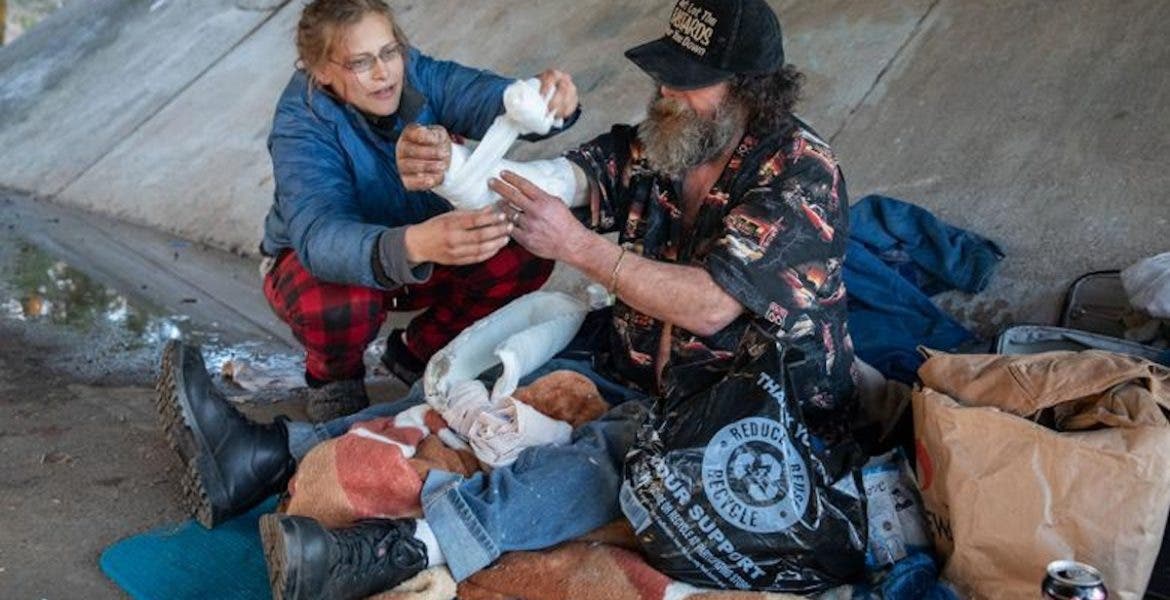The highest court in the richest country in the history of mankind will soon determine whether a municipality can put a black mark on one’s criminal record solely because one is too poor to afford a studio apartment. A hearing in front of the U.S. Supreme Court was held on Monday in City of Grants Pass v. Johnson. The case will essentially determine whether a city can criminalize homelessness.
The ordinance at issue seems to have been carefully crafted so as to not seem to be about poverty and homelessness so much as who can be where, when, while doing what with what. But it’s about being homeless.
Grants Pass is a city in southwest Oregon with about 40,000 people. In 2013, the city drafted, passed, and enforced an ordinance making it illegal to sleep on public property while using bedding or something to soften the concrete — which could apply to anyone using a tent, sleeping bag, or blanket to get through a cold night.
The ordinance likely doesn’t apply to wealthy people lying on a towel in the grassy park during summer and falling asleep while reading a book.
The ultimate ruling looks almost predestined in front of this court as it is currently constituted. More interestingly, the case arose out of homeless citizens suing the city under the Eighth Amendment, which addresses cruel and unusual punishment. Thus, if the Court rules on behalf of Grant’s Pass, the case becomes less about whether a city can criminalize homelessness and more about “how harsh” the city can be. (More on that below).
To some of us, this would seem more like a 14th Amendment case and due process, which requires “notice” of what is prohibited and a “meaningful opportunity to be heard. “Notice” of the crime would be difficult given the vague definitions, and a “meaningful opportunity to be heard” may be all but impossible for people with too little money to even sleep in a car. (Citations do not require a public defender, either).
Regardless, under the 8th Amendment, the generally liberal Ninth Circuit ruled 2-1 against the city, saying it was unusually cruel to criminalize sleeping outside with something comforting.
Somewhat surprisingly, this is a truly bipartisan issue, with both liberal and conservative city leaders against anyone with different ideas as to how to solve homelessness (Especially on the West Coast, where rents continue to rise – sending homelessness up 12% in just January of this year.)
California’s Democratic Governor Gavin Newsom wrote:
“The United States Supreme Court can establish a balance that allows enforcement of reasonable limits on camping in public spaces, while still respecting the dignity of those living on our streets.”
Yes, “balance” would be a keyword — especially in a case brought under the 8th Amendment. If an ordinance carries a fine, it does seem particularly cruel and unusual to apply additional expenses (“Street rent”?) or cure homelessness with shelters that either look like jails versus sending people to actual jails as a “home.”
As noted above, the Court’s thumbs up or thumbs down on the case will likely depend more on the wording it uses rather than the ultimate winner or loser.
John Do, a senior litigator for the American Civil Liberties Union, states, “If the Supreme Court were to allow for such a punitive regime, then we’re going to have a race to the bottom to make it as uncomfortable as possible for people to survive.”
Exactly. An ordinance may carry a penalty such as “clean up your area and use one of the city-sponsored shelters” to “forfeit your belongings outside and spend one month inside a jail cell.” But yes, depending on the locality and resources, one can easily envision a scenario where cities push the limits to incentivize working three jobs in order to share a studio apartment with three people.
Kentucky wants to legalize allowing the police to assault the homeless.
There is a truism. People wealthy enough to have never had to consider “what if” can be as liberal as Noam Chomsky but have little heart and a lot of irritation while driving past tents or seeing entire parks overtaken. It just “is.”
“Race to the bottom” is right.
There are other tools. It would be interesting to see what a commitment to increasing the minimum wage while increasing Section Eight housing might do for the problem. Grants Pass isn’t the only city to have litigated this question. From Rolling Stone’s report:
“Boise, Idaho, was another city that effectively outlawed homelessness via anti-camping laws until the city was sued in 2018….The Ninth Circuit ultimately ruled that residents without permanent shelter could not be arrested only because they were homeless, limiting how cities can respond to homeless encampments with enforcement sweeps.”
The case led to a massive increase in encampments, especially in San Francisco and Los Angeles, which likely led to this.
It all depends on one’s priorities.
In mid-April in Grants Pass, Oregon, it would seem like one’s highest priority is keeping dry, whether one is in a tent or a 20,000-square-foot house.
This report is based on original reporting by Jeremy Childs of Rolling Stone.
Editor’s note: This is an opinion column that solely reflects the opinions of the author.
Jason Miciak is an Editor at Large for Washington Press.

